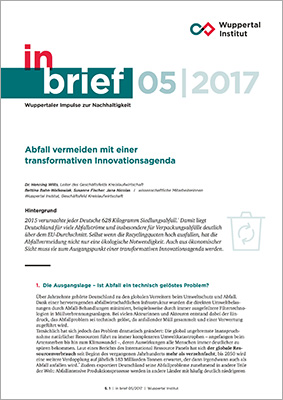Abfall vermeiden mit einer transformativen Innovationsagenda
Wuppertaler Impuls zur Nachhaltigkeit

In 2015, each German citizen had generated an average amount of 628 kg of municipal waste. Germany, often referred to as the world's "champion of recycling", has recycling rates above the EU average for most waste streams. But while the rates are high, waste prevention is the actual top priority in the waste hierarchy. It constitutes a starting point for a transformative agenda of innovations from an economic and ecological perspective and, if implemented consistently, would reduce pressure on the environment.
The legislative basis for waste management in Germany is the Law on Closed Cycle Management and Waste and the Waste Prevention Programmes of federal and state governments. The implementation of waste prevention, however, reveals certain challenges stemming from cross-cutting policies: While the treatment of waste can be easily regulated and controlled at the end of the value chain, like it is the case for recycling policies, a successful waste prevention requires a cooperation of different players throughout the entire value chain and starts with the product and packaging design.
A basic requirement for promoting waste prevention is a good dialogue across all value chain actors. As an example, (a) the federation and the state authorities should set long-term indicators and goals for waste prevention, which are clearly defined, transparent and quantifiable. Special attention should be paid to the correlation between total waste generation and economic development, measured as waste intensity. As a supplement to federal and state actors, (b) regional municipalities play a key role when putting waste prevention into practices. They are able to closely cooperate with citizens and jointly experience the reduction of waste, as resulting in lower costs of living and an improvement in quality of life. Necessary approaches should not only include public measures but also foster a stronger inclusion of (c) the industry. Many industries already show an interest in waste prevention, nevertheless, most plans and practices are lacking commitment and concreteness. Especially the reparability of products is of great importance and should be considered during the phase of planning and designing products. Finally, the inclusion of the (d) actual consuming and (presently) waste generating individuals into waste prevention strategies is crucial. Smart and regulating mechanisms should aim at changing social roles, norms and group identifications in order to collectively transform individual behaviours towards a waste prevention culture.
The Wuppertal Institute will work on a database, which allows a transparent comparison of different waste prevention measures. This will include an evaluation of potential economic benefits, encouring different stakeholders to accomplish waste prevention measures.
